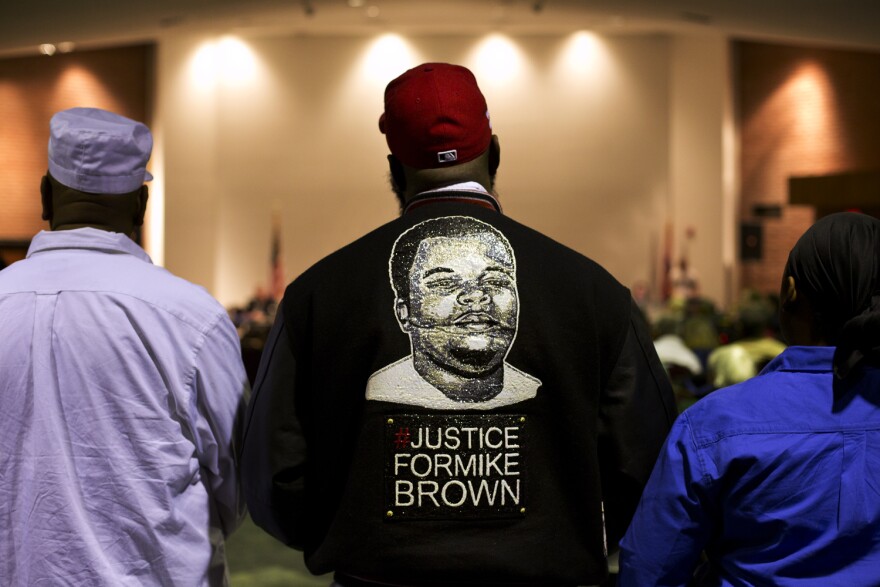Faced with one of the most monumental decisions in its city’s history, the Ferguson City Council voted to attach conditions to a consent decree with the federal government.
The move is not sitting well with some of the embattled city’s residents – or the Department of Justice.
At issue is an expansive decree that would make major changes to the city’s police department, courts and administration. The agreement would also require Ferguson to pay for a monitor to track compliance.
The decree provoked strong reactions from Ferguson residents: Some believed the agreement was a necessary step to move forward after Michael Brown’s death. Others, though, openly worried about the decree’s cost – especially since the city is in a tough budgetary situation.
After more than an hour of public comments that included an appearance from Michael Brown Sr., the council passed a bill agreeing to the decree if certain conditions were met. They include:
- Eliminating a mandate to pay city employees higher salaries
- Extending the deadlines for compliance
- No longer applying the consent decree to other governmental entities that take over Ferguson’s governmental services, such as its police department. Ferguson Mayor James Knowles III called the provision a “poison pill,” saying no law enforcement agency would agree to patrol Ferguson if it had to adhere to the terms of the consent decree.

While the decision provoked a lot of anger – and a bit of frustrated shouting – from some in the packed Ferguson Community Center, Knowles said the changes are necessary for the city to move forward.
“We’re really talking about salary increases for employees and a few other small provisions,” Knowles said. “I think [we’re adhering] to the spirit of this very large and expansive agreement – arguably one of the most expansive decrees they’ve ever issued. We are going to be still complying with the vast majority of that which they’ve laid out.”
Ferguson Councilman Wesley Bell, an attorney who was part of the city’s delegation that negotiated aspects of the decree, proposed the conditions that the council adopted unanimously. He said the decree wouldn’t do any good for Ferguson if the city can’t afford the changes.
“It’s more important to actually see these things work than to see the city go away and these things won’t happen,” Bell said. “No other city is doing the extent of community policing that we’re doing. No other city is doing the extent of court reform that we’re doing. And if Ferguson goes away, you’re not going to see these changes. And I want to see these changes. I want to see this reform. I want to see this progress.”

Chilly reception
Soon after the council took its action, the head of the Justice Department’s civil rights division cast serious doubt on whether the agency would accept any modification to the decree.
Vanita Gupta said that the council “attempted to unilaterally amend the negotiated agreement. ... (The vote) creates an unnecessary delay in the essential work to bring constitutional policing to the city, and marks an unfortunate outcome for concerned community members and Ferguson police officers.”
“Both parties engaged in thoughtful negotiations over many months to create an agreement with cost-effective remedies that would ensure Ferguson brings policing and court practices in line with the Constitution,” Gupta said. “The agreement already negotiated by the department and the city will provide Ferguson residents a police department and municipal court that fully respects civil rights and operates free from racial discrimination.
“The Department of Justice will take the necessary legal actions to ensure that Ferguson’s policing and court practices comply with the Constitution and relevant federal laws,” she added.

Some Ferguson residents who have been critical of the city’s government expressed bewilderment regarding the council’s decision. Instead of heading off a costly legal fight, Lee Smith contended that the decision made a lawsuit inevitable.
“If the city sticks with that, they will take them to court,” Smith said. “I don’t think the Department of Justice will turn around and say, ‘Here’s what we have decreed and here’s what we’ve written, so you’re telling us the only way we’ll accept it is if you change it and do what we want done.’ I don’t think they will accept those amendments.”
Nick Kasoff, who ran against Knowles for city council in the 2000s, said that the some of the conditions could have unintended consequences for the city.
“I can’t imagine the Department of Justice accepting the provision … that would allow this city to subcontract its police services without the requirement of the decree following the subcontract,” Kasoff said. “That opens the door to some mischief that the DOJ isn’t going to allow.”
Others like Emily Davis said the council’s decision provided more uncertainty about the city’s future – and sent a bad message to the Ferguson’s African-American population.
“What happened here tonight was that Ferguson City Council told the African-American people of Ferguson that their justice was negotiable and their constitutional rights were negotiable,” Davis said. “And tomorrow morning, we will all be able to analyze this and see the optics and see that’s what we heard here tonight.”
But Bell said Ferguson has changed for the better, adding that the city has either implemented or is implementing aspects of the consent decree.
“When you look at the way that policing has changed, the way that policing is going to be constitutional, we’re going to start doing that regardless,” Bell said. “Whether the Department of Justice accepts these proposals or not, we’re still going to move forward with it – because they’re the right thing to do.”
























